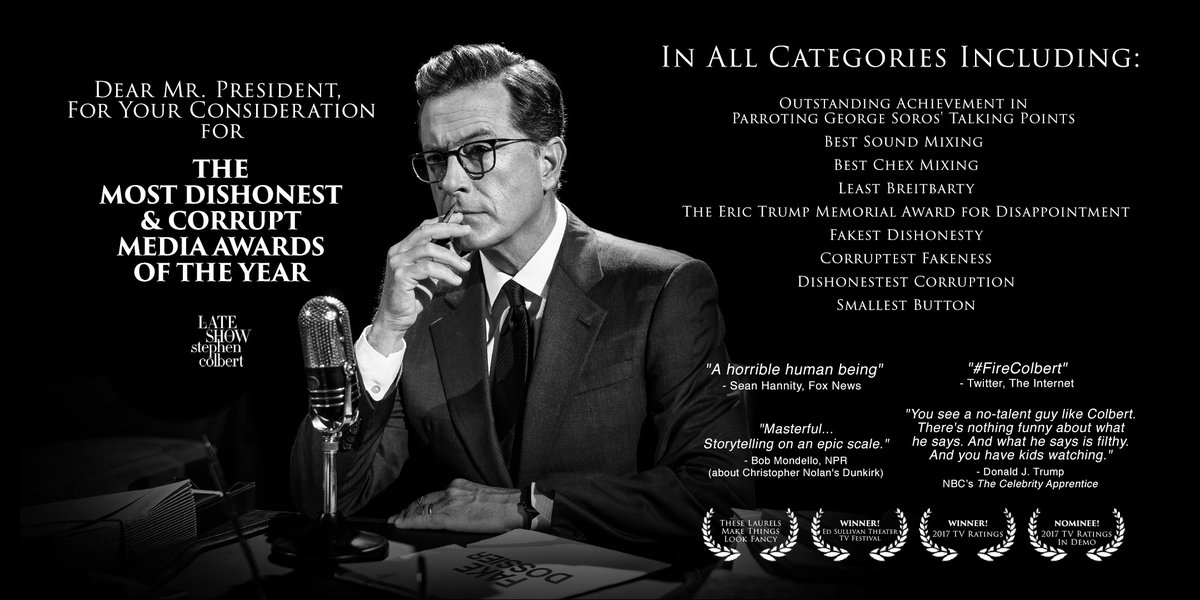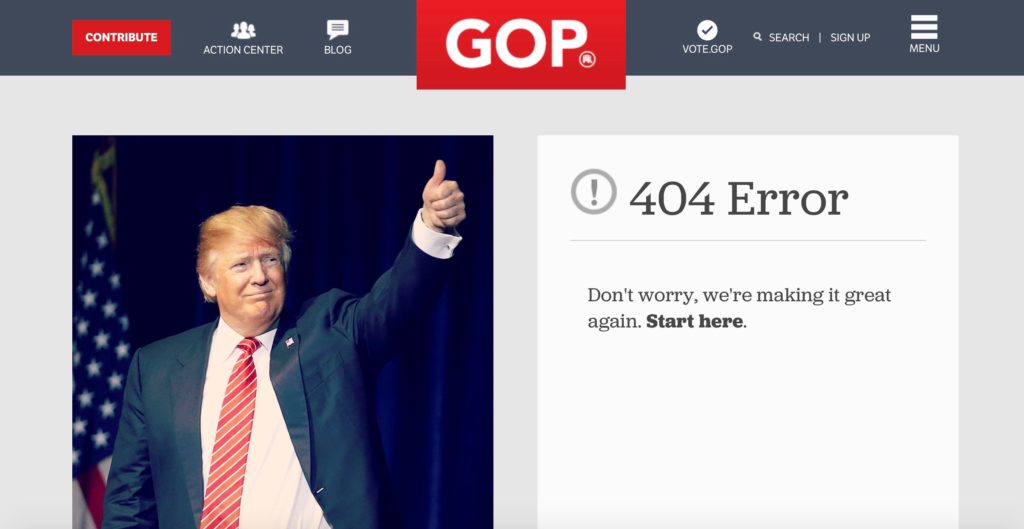In the end, last night’s sideshow probably stands as a pretty appropriate summation of the presidency as it approaches the one-year anniversary of Donald Trump’s inauguration.
So, despite the Republicans being in charge of both the House and the Senate, there could be a government shutdown at midnight on Friday, as wrangling continues over immigration, healthcare and a short-term funding measure to keep the lights on. But last night, one thing was helping distract from all of that (and the President’s health, or his alleged affair, or relations with North Korea) – the “fake news awards”.
After being first raised by Trump last November, then originally set for January 8th, it was rescheduled for yesterday; when White House press secretary Sarah Huckabee Sanders said it had become merely a “potential event,” whatever that meant. There was even a warning from ethics experts, as Politico reported, that White House staffers could be in breach of the Standards of Ethical Conduct if they were to take part.
The whole thing seemed a bit touch and go. Flaky, even.

But the late night comedians were ready. Stephen Colbert and the Daily Show’s Trevor Noah had taken Times Square billboards and full-page newspaper ads for the original event. As Reuters reported:
In a tongue-in-cheek war of insults, “The Daily Show” has also run videos asking whether Colbert and comic Samantha Bee of “Full Frontal” on TBS “can really be mistrusted,” and proclaiming the satirical show’s South African-born host, Trevor Noah, “literally un-American.” Public radio’s predominantly serious “On the Media” show last week ran spoof red-carpet coverage of “The Fakeys,” with various newspaper and TV journalists jostling for fake-news honors.
Samantha Bee even had an acceptance speech prepared…
But you always had a sense that the administration too wasn’t going to miss an opportunity for some cheap publicity and cheap shots. And when a tweet finally came from Trump, as we all knew it would, it teased the “winners” of the “highly anticipated fake news awards” with a link to a broken page at GOP.com and then – as these things often do – to a fundraising poll, then, eventually, to a list of winners (or losers).
When he first raised the idea, Trump had famously said in his original tweet that his competition “wouldn’t include Fox News”, yet a poll at the time showed most respondents thought both that fake news “is a big problem” and that Fox was top of the tree in that category.
The President – who even proffered at one point that he personally had invented the concept – has averaged one “fake” insult a day since his inauguration, according to CNN’s Brian Stelter; whether that’s attacking “fake news” “fake polls” “fake media” or “fake stories”. Factcheck.org looked at some of the more egregious claims.
But the issues behind the sort of circus we saw yesterday are very real and – deadly – serious. In an opinion piece entitled ‘Mr President, Stop Attacking The Press’, Arizona Senator John McCain wrote in Tuesday’s Washington Post:
Ultimately, freedom of information is critical for a democracy to succeed. We become better, stronger and more effective societies by having an informed and engaged public that pushes policymakers to best represent not only our interests but also our values. Journalists play a major role in the promotion and protection of democracy and our unalienable rights, and they must be able to do their jobs freely. Only truth and transparency can guarantee freedom.
McCain, in the bulk of his article, also raised the important point that “whether Trump knows it or not, these efforts are being closely watched by foreign leaders who are already using his words as cover as they silence and shutter one of the key pillars of democracy.”
As Politico reported last month, leaders or state media in at least 15 countries have “used the President’s favorite denunciation to quell dissent [and] question human rights violations.” While Trump’s own use of rhetoric like infamously calling the press “enemies of the people” was referenced in a speech by the other Arizona Senator, Jeff Flake, who spoke about the damage of “sustained attacks” on the press and the need for “the truth to take a stand”. It’s a shame there weren’t more Senators present to hear him.
By now, few people, certainly, would argue that “fake news” and the threat it poses – both to free speech and the idea of a discourse based on mutually-agreed facts – isn’t a problem. And as its distribution becomes increasingly sophisticated, the challenges of countering it must become more urgent.
But one of the biggest hurdles lies in its very definition. Fake news isn’t just something the reader disagrees with, or an honest mistake that has been corrected. In whatever form, the normalization of the idea of “fake news” isn’t just intended to get a reader to believe something that’s not true; it’s to get them to distrust everything that is.
And in that fundamental goal – the delegitimizing of the press for political ends – it’s largely the case that Trump’s efforts are succeeding. Yet, while it’s unreasonable to expect journalists not to cover the President, surely there are ways to do so without buying into the sort of anti-media spectacle of these “awards”. It’s what linguistics scholar George Lakoff wrote about as the danger of “accepting the framing” of a particular narrative.
In an interview with Marketplace’s Kai Ryssdal last year, Lakoff talked about how to counteract the techniques of distraction the President has virtually perfected.
Ryssdal: What, then — and you’re critical actually of how the media is covering Mr. Trump, and the words we are using. So, what are we to do when our job is, in theory, to inform rather than persuade?
Lakoff: Excellent. What you do is, first of all, understand he’s probably trying to get away from anything important you’re saying that’s true. So say your important truths first. Always preempt with the truth. Frame first with the truth and with what is important. Next, if he he’s saying, if he has a diversion about something unimportant, he’s attacking Meryl Streep or something, you again point out that there is a diversion, and you start talking about whatever is true there about it. Then if he has a tweet, and these tweets are all strategic to divert your attention from other things, or to do preemptive —
Ryssdal: That’s what I’ve been saying, that’s what I been saying! Sorry, that’s what I’ve been saying on Twitter for a year and a half.
Easier said than done, perhaps, in this sort of competitive environment, where everything Trump says, does or Tweets is a driver of traffic.
At an event at the Newseum in Washington last night, CNN’s Jim Acosta, one of Trump’s particular and repeated targets at press conferences, called the President “the king of fake news” and that when he does “unpresidential” things like [the ‘awards’], it’s nothing less than “an insult to journalists around the world” who were operating in war zones and struggling every day to tell their story. Later, as the President’s tweet to the broken link circulated, Acosta tweeted simply: “Crushed by the weight of its own absurdity.”
Acosta and another lightning rod of the White House press corps, April Ryan, spoke during the Newseum event about the changing climate for reporters as well as death threats against members of the media.
Certainly it seems that the heightening of a broad antagonism against the press among pro-Trump voters – which began at least during the primary campaign – is now just as normal and accepted as whatever the latest scandal washing over us with apparently no consequences happens to be. At yesterday’s White House press briefing, for example, Sarah Sanders did not receive a single question about the President’s alleged affair with a porn star.
And if we needed any further proof of the polarization in attitudes to trust in media (and just take a look at the division within the Tweets that showed up last night under a search for “Newseum Acosta”), a new study from the Gallup-Knight Foundation indicates that:
Four in 10 [or 42 percent of] Republicans consider accurate news stories that cast a politician or political group in a negative light to always be “fake news.” [The corresponding figure for Democrats is 17 percent.]
Today, the “failing” New York Times is turning its opinion page over – “in the spirit of open debate” – to letters from Donald Trump supporters. One reads, in part: “Much of the media, as the hotbed of hatred against Mr. Trump, has pushed me more toward him than his social behavior has done the opposite.”
That conviction on the part of Trump’s supporters that a free press is their enemy and, like their President, the belief that the press is irredeemably ranged against them; that’s the part of all this that is anything but fake. And that’s the part that will be the most difficult to correct.
Suggested related stories:
Also published on Medium.

